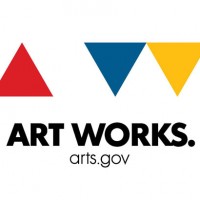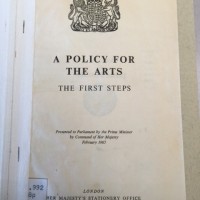April 16, 2015 marked the opening session of a conference held at the School of Public and Environmental Affairs at Indiana University Bloomington, on Advancing the Field(s) of Nonprofit Management: New Structures, New Solutions. I was asked to speak about the arts, specifically about relationships between nonprofit arts organizations and the commercial and public sectors. Our session chair, my SPEA colleague Beth Gazley, asked us to say something ‘provocative’ in our allotted few minutes. So, for what it’s worth… Artists, and nonprofit arts … [Read more...]
A note on key performance indicators
My son goes to a wonderful elementary school - all his teachers have been terrific. His county school board produces the worst report cards ever (so far). The report cards are 'growth-based', meant to measure progress from competency levels exhibited at the beginning of the school year. Fair enough. But there are 40 'essential learnings' in language, and 26 in math. And the parent has no guide as to which of these 'essential learnings' have been emphasized in class, or as to which are most important for general progress. My older children … [Read more...]
Dynamic pricing and market segmentation at the theatre (and the hospital)
This post is about theatre pricing, from a unlikely source. Today's New York Times has a piece by Austin Frakt on hospital pricing, and whether and how changes in funding of patients through public sector programs might change hospital charges to privately insured patients. Mid-way through, the article looks for an analogy from the arts: The theory that hospitals charge private insurers more because public programs pay less is known as cost shifting. What underlies this theory is that a hospital’s costs — those for staff, equipment, supplies, … [Read more...]
Does culture’s share of GDP matter?
I don't see how it does. Americans for the Arts sees it differently - writing about the recent Bureau of Economic Analysis accounts, they write: Much has been written about the truly mind-bending sum of $698.7 billion in industry expenditures—a substantial contributor to the economy that supported 4.7 million jobs in 2012 and represented 4.32 percent of GDP. How big is $698.7 billion and 4.3 percent of GDP? If the arts and culture in the U.S. was a state, its $698.7 billion would be larger than the Gross State Product for 45 out of 50 … [Read more...]
Arts organizations and the quest for data
There is an interesting interview from TRG Arts regarding the benefits to arts organizations from hiring someone to manage data. Heather Kitchen, Managing Director of Dallas Theater Center* says: When I began as the chief administrative person at a theater 25 year ago, even a large regional theater did not have a computer driven ticketing package. As time evolved, and we moved past Lotus 123 spreadsheets for tracking ticket sales, I observed and appreciated the power of accurate data and how it could be a powerful tool - not a decision maker, … [Read more...]
A Policy for the Arts: The White Paper of 1965 (updated with a link)
During the past few weeks the British art world has been marking the 50th anniversary of the publication of A Policy for the Arts: The First Steps, a White Paper authored by Member of Parliament Jennie Lee, presented to Parliament on behalf of the Labour government of the time (on twitter, check #ArtsPolicy50 for a number of links to various commentaries). Unfortunately I know of no version of the paper online, which is a shame (readers - please share a link if you have one?). The paper is concise: 16 pages of text, no glossy pictures of … [Read more...]
On the return to public investments in museums
Arts Council England has released a new report that seeks to quantify the 'economic impact' of museums. It estimates that to be £1.45 billion. That doesn't matter much - there are no insights to be gained, no policy implications, from the estimate's being £1.45 billion or £2.07 billion or £1.03 billion. Still, ACE thought that funds spent on producing this report were useful for something, useful enough to justify the opportunity costs in reduced funding for artists and arts organizations - maybe there will be a follow-up study that explains … [Read more...]
Superstars have always been with us
Paul Krugman takes a look at top earnings amongst musicians, and the 'superstar' effect - the idea that the vast share of consumer spending on music will go to a very small number of performers, since they can reach very large audiences through recordings and broadcasts (see my previous post here). He writes: What makes this an interesting story for music is that what technology gave, it is now taking away: digital, streamed music is hard to monetize, so that artists are forced back on live performance. So you might expect to see some … [Read more...]
Price discrimination, time and money at the theatre
Mixed Blood Theatre of Minneapolis has an interesting pricing model, which they call 'radical hospitality': Radical Hospitality erases economic barriers in pursuit of building a truly inclusive, global audience. Whether a patron is a long-time Mixed Blood attendee, a new immigrant living in Mixed Blood’s Cedar-Riverside neighborhood, a person with low income or disabilities, a college student, or someone who has never been to theater, he or she will be welcomed, free of charge—with radical hospitality. How does it work? There are two ways to … [Read more...]
Minimum wages in the cultural sector: the case of Borderlands Books
Borderlands Books, of San Francisco, will be closing its doors. Brick-and-mortar bookstores face a tough market situation, and those that are paying San Francisco-level rents even more so. But according to the owners, the straw that broke this camel's back was the mandated increase in the minimum wage. From Borderlands blog: In November, San Francisco voters overwhelmingly passed a measure that will increase the minimum wage within the city to $15 per hour by 2018. Although all of us at Borderlands support the concept of a living wage in … [Read more...]










